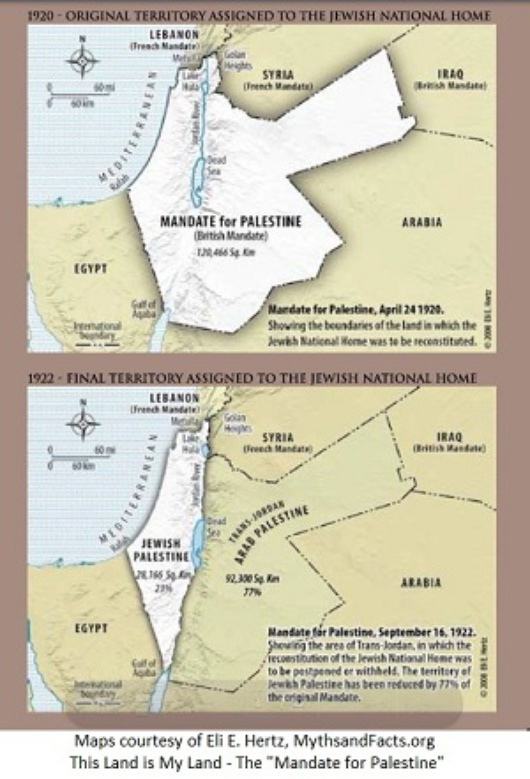
A Jordanian-Palestinian Confederation Is On The Move
Published on
Article first published as A Jordanian-Palestinian Confederation Is On The Move on Technorati. Israeli Prime Minister Benjamin Netanyahu and Jordan's King Abdullah II had a secret meeting in Jordan during Xmas.
After leak to media it was officially confirmed (PM press office) that the two leaders discussed Syria's Chemicals - whether Syrian President Bashar Assad would use chemical weapons against rebels in the civil war and whether they could fall into the hands of radical elements. However the real agenda of the meeting is more interesting. Debkafile’s sources reveal that the issue was the aspects of a possible confederation between a Palestinian West Bank state and the Hashemite Kingdom. The meeting can be seen also in wider context as part of the new Sunni-Muslim-led pro-US axis.
 According Debkafile
the Jordanian option has become a focal talking point in Amman,
Washington and Palestinian centers. Netanyahu brought some pointed
questions to the highly confidential one-on-one at the Hashemite palace:
He asked the king how much responsibility would Jordan undertake in
controlling West Bank security and intelligence activity? What were his
plans for extending such control from the West Bank to the Gaza Strip?
And how would Jordan’s intentions fit into the security arrangements
demanded by Israel in both territories as part of any accord with the
Palestinians?
According Debkafile
the Jordanian option has become a focal talking point in Amman,
Washington and Palestinian centers. Netanyahu brought some pointed
questions to the highly confidential one-on-one at the Hashemite palace:
He asked the king how much responsibility would Jordan undertake in
controlling West Bank security and intelligence activity? What were his
plans for extending such control from the West Bank to the Gaza Strip?
And how would Jordan’s intentions fit into the security arrangements
demanded by Israel in both territories as part of any accord with the
Palestinians?
Jordanian option on the move
As Jordan has already recognized Israel and the two nations maintain full diplomatic relations the recognition process - a Palestinian state by Israel and Israel by the Palestinians as the national state of the Jewish people - would be skated round. While the UN General Assembly’s Nov. 29 upgraded the Palestinians to non-member observer status the Palestinian Authority is acting like representing an independent state and therefore eligible to join Jordan as a confederation partner. This kind of approach might be easier also for Hamas which would be saved from having to recognize the state of Israel.
 There
are more straws in the wind attesting to the confederation project
being on the move. According Debkafile's sources in early December, the
Palestinian Authority’s Chairman Mahmoud Abbas (Abu Mazen) secretly
advised certain Palestinian leaders “to be prepared for a new
confederation project with Jordan and other parties in the international
community.” With these he probably was referring to Egypt, Jordan,
Turkey and Qatar – these are the members of the pro-American Sunni
Muslim-led axis which American diplomats established in Cairo last month
in the course of Israel’s Pillar of Defense operation in Gaza and the
negotiations that led to an Israel-Hamas ceasefire.
There
are more straws in the wind attesting to the confederation project
being on the move. According Debkafile's sources in early December, the
Palestinian Authority’s Chairman Mahmoud Abbas (Abu Mazen) secretly
advised certain Palestinian leaders “to be prepared for a new
confederation project with Jordan and other parties in the international
community.” With these he probably was referring to Egypt, Jordan,
Turkey and Qatar – these are the members of the pro-American Sunni
Muslim-led axis which American diplomats established in Cairo last month
in the course of Israel’s Pillar of Defense operation in Gaza and the
negotiations that led to an Israel-Hamas ceasefire.
On Xmas eve 2012 it was revealed that Turkey had assumed its role in this new bloc by dropping its two-year boycott of military cooperation with Israel within the framework of NATO. Ankara initially cut off ties of cooperation over the IDF raid of the Turkish Mavi Marmara ship which was on a mission to break Israel’s naval blockade of the Gaza Strip. In recent months, Mossad chief Tamir Pardo and the Turkish MIT intelligence director Fidan Hakan maintained back-channel interchanges and laid the groundwork for the two governments to start working together.
New boost for new approach
Nearly two months ago I wrote an article Palestinians Put Jordanian Option on the Table . There I described how Farouk Kaddoumi, a veteran PLO official, dropped a political bomb on 31st Oct. 2012 with a call for “returning” the West Bank to Jordan during an interview with the London-based Al- Quds Al-Arabi newspaper. Kaddoumi, who is based in Tunisia, said he supported the idea of a federation or confederation between the West Bank and Jordan. His remarks are the first of their kind to be voiced by a senior PLO figure in decades. Kaddoumi is one of the founders of Fatah, and for decades served as head of the PLO’s “political department.”
In the same article I reported about statement made by Jordan’s Prince Hassan bin Talal of Jordan, who served as crown prince between 1965 and 1999. Recently October 2012 in a meeting with Palestinian citizens in Jordan, Prince Hassan bin Talal made an unusual statement, saying that the territories of the West Bank are actually part of the Hashemite Kingdom of Jordan. He added that the two state solution is irrelevant in the current stage.
Some background
 The
Jordanian option has on occasion been raised as a promising approach.
Given some of the facts from history this is not surprising, after all,
most of Jordan’s population is Palestinian. In 1948, Arab armies
attacked the newborn State of Israel. Transjordan annexed the area
intended for an Arab state, and renamed itself the Kingdom of Jordan,
calling the annexed area the “West Bank”. In 1967 West Bank came under
Israeli control during the Six Day War of 1967.
The
Jordanian option has on occasion been raised as a promising approach.
Given some of the facts from history this is not surprising, after all,
most of Jordan’s population is Palestinian. In 1948, Arab armies
attacked the newborn State of Israel. Transjordan annexed the area
intended for an Arab state, and renamed itself the Kingdom of Jordan,
calling the annexed area the “West Bank”. In 1967 West Bank came under
Israeli control during the Six Day War of 1967.
Jordanian option is implementing three-state solution - in its no-state meaning – if both West Bank and Gaza are annexed to Jordan. However more practical solution on the ground might be to annex Gaza to Egypt as this would be the three-state solution in its full meaning advocated e.g. I. Since 1967 Israel has maintained the separation between the West Bank and Gaza through different political and security means, such as leaving Jordanian laws in effect in the West Bank while leaving Egyptian laws in effect in Gaza, and substituting some of those laws with military statutes.
I have been advocating long Three State Option as the most pragmatic solution to Israeli-Palestinian conflict. The geographic juxtaposition between Israel and Jordan should make delineating the border between the two countries in an agreement considerably easier than reaching a deal on a border between Israel and a Palestinian state that was planned to be established in the area. If three state solution will be implemented so Israel would receive security guarantees from Jordan’s monarchy, which made peace with Israel in 1994, rather than from a politically enfeebled Palestinian president as well from Egypt, which has peace deal with Israel since 1978, rather than from outside supervised Hamas.
Further development after Israeli elections
”Die Zukunft zeigt sich in uns - lange bevor sie eintritt” (Rainer Maria Rilke)
The Aim for the next stage of Israel-Palestinian negotiations after Israeli elections on January 2013 seems to be a long-term interim accord, while the core disputes on permanent borders, Jerusalem, the Palestinian refugees and the future of Israel’s settlements in Judea and Samaria would be leaved to a later round of negotiations at some unspecified time in the future.
During election campaign Netanyahu and his party has been described as extreme right-wing nationalists who consistently refused to talk peace with the Palestinians. This is usual in Israel where hard rethoric transforms more moderate after elections. So if and when PM Netanyahu wins the poll it is possible that he also will return to the peace track after forming his next government, indeed it has also claimed that Israel and the Palestinians had agreed to resume peace negotiations in March 2013. Recently Israeli media published reports that PM Netanyahu planned to invite opposition leader and former foreign minister Tzipi Livni to join the next cabinet in her old job as lead negotiator in talks with the Palestinians. However it is estimated that Netanyahu has reserved that role for himself.
The bottom line
”Man muss das Unmögliche versuchen, um das Mögliche zu erreichen” (Hermann Hesse)
Personally it is very refreshing that Jordanian option is moving on. For decades regional leaders, international community UN etc have sung the praises of two-state solution as the only option so my view has represented some kind of dissidence. While some prominent politicians now have came to the same conclusion I think that the reasons might be the same as mine: there is some sense with Three-state option, it is both pragmatic and achievable. Now it is also more acceptable than few years ago.



